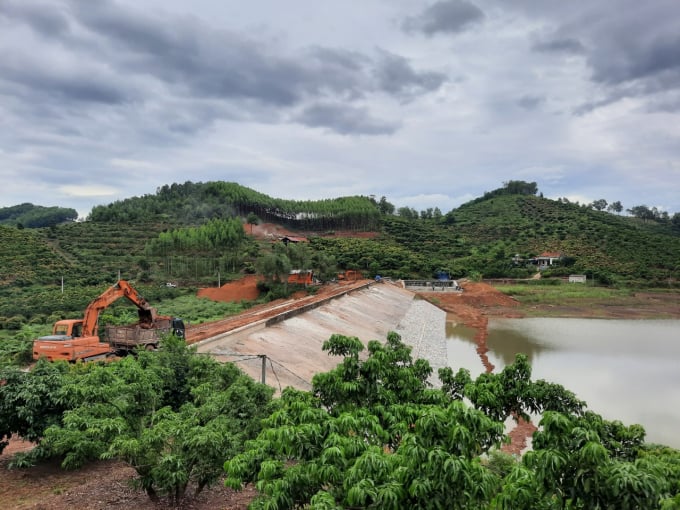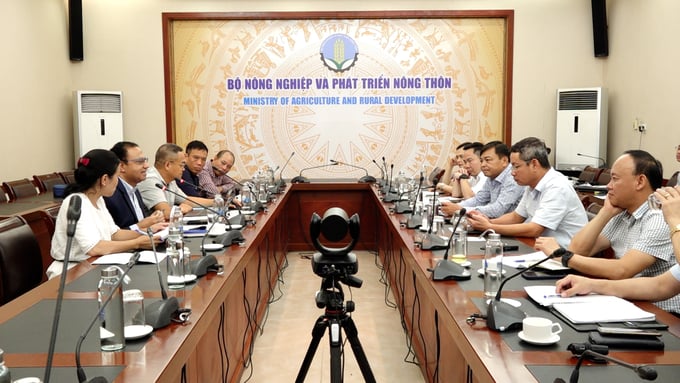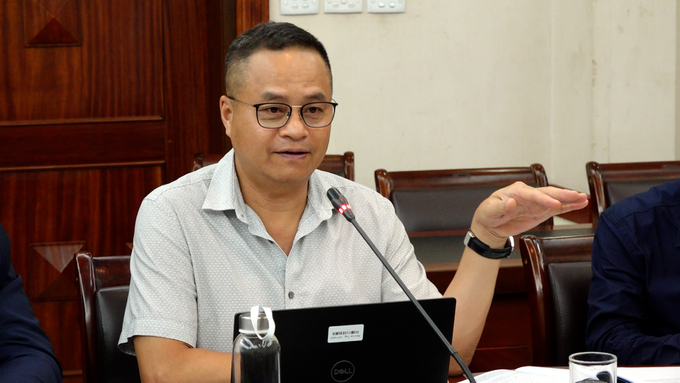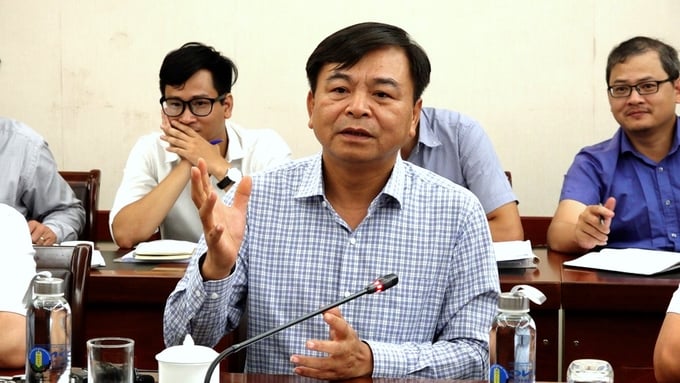June 20, 2025 | 21:54 GMT +7
June 20, 2025 | 21:54 GMT +7
Hotline: 0913.378.918
June 20, 2025 | 21:54 GMT +7
Hotline: 0913.378.918
Vietnam Dam Rehabilitation and Safety Improvement Project (WB8) is funded by the World Bank (WB) between 2016 and 2023. The project seeks to improve the safety of specific dams as part of the Government's Dam Safety Program in order to protect downstream communities and economic activities through prioritizing investments and enhancing the capacity to protect residents and socioeconomic infrastructure in lowlands. After deductions, the total investment for the undertaking reached USD 337 million, which included USD 28 million of domestic reciprocal capital.

WB8 project at Dong Man lake, Luc Ngan district, Bac Giang province. Photo: Minh Phuc.
The total number of authorized lakes on the list is 475, of which 463 are under construction and 39 are not yet under construction. As a result of the World Bank's agreement to extend the project until June 30, 2023, six months earlier than originally planned, ODA capital will no longer be used to fund its construction.
The Ministry of Agriculture and Rural Development issued a decision on May 8, 2023, authorizing the adjustment of 436 lakes to the list of lakes for construction. To date, 409 lakes out of a total of 436 that have been begun have been completed, while 27 are still under construction. Up to 26 of the 27 lakes under construction have completed over 80% of their work. Only the Tha Lake in Hoa Binh has a significant amount of unresolved construction.
According to the WB8 Project Management Board, following the completion of the project, the Board will urge the eight provinces of Phu Tho, Hoa Binh, Hai Duong, Thanh Hoa, Ha Tinh, Quang Nam, Phu Yen, and Dak Lak to construct the remaining 27 lakes.
Thai Nguyen, Phu Tho, Thanh Hoa, Quang Ngai, and Dak Nong must secure sufficient ODA for allocation and re-lending. In addition, the WB8 Project Management Board will continue to coordinate with relevant units, finalize the adjustment of the project's capital structure, and cancel the excess capital for the unfulfilled activities; implement project completion reports; and finalize procedures for closing ODA-funded projects.
Mr. Ahmed Eiweida, Vietnam Sector Leader for Sustainable Development (WB), stated during the summarizing session of the Inspection team evaluating the project that the WB8 project is a protracted voyage involving WB, MARD, and 33 localities.

Summary meeting of the Monitoring and Evaluation Team of the Dam Safety Improvement and Repair (WB8) project. Photo: Quang Linh.
Due to the efforts of all parties involved, the project has yielded numerous positive outcomes, particularly in preventing dam-related hazards to human life and socioeconomic factors.
Mr. Ahmed Eiweida expects the restructured project to disburse between 98 and 99 percent of the total capital allocated. The World Bank loan has been disbursed in the amount of USD 274 million, which is equivalent to 83 percent of the project's total capital.

Mr. Pham Hung Cuong, senior irrigation expert of the World Bank. Photo: Minh Phuc.
Pham Hung Cuong, a senior irrigation expert at the World Bank, stated that as of the 15th of June, 83% of the USD 273 million allocated to the project had been disbursed. On June 30th, the majority of investments in the construction, maintenance, and improvement of reservoirs and dams were completed or concluded.
Deputy Minister Nguyen Hoang Hiep estimated that the project's implementation will take 7 years in 33 provinces and cities, with 90% of its budget allocated to minor initiatives and subcomponents. Due to the project's complexity and scope, MARD deemed it to be excellently completed.

Deputy Minister of Agriculture and Rural Development Nguyen Hoang Hiep assessed the implementation of the WB8 project. Photo: Quang Linh.
Notably, according to the WB8 initiative Management Board's report, 2,9 million persons directly benefit from the initiative, including 1,4 million women (7.4% more than anticipated). In addition, direct benefits from the downstream area reached an additional 5.06 million people (23.3% more than planned), including 2.47 million women (17.5% more than planned).
The consulting services include the following deliverables: Environmental safety report; dam safety report; feasibility research report; environmental impact assessment report; construction protection design; safety policy screening; dam safety report. All social security reports are submitted on time or ahead of schedule.
Deputy Minister Nguyen Hoang Hiep proposed that the Central Management Board of Irrigation Projects, the Department of International Cooperation, and the Department of Irrigation coordinate with related parties to swiftly adjust the overall investment policy of the project so that the provinces are reciprocal capital contributors.
The deputy minister also requested that, if 27 lakes currently under construction are not completed by June 30, local governments will begin actively arranging funds to complete the project on July 1.
The project comprises three components:
Component 1: Rehabilitation of dam safety - This component will enhance dam safety by rehabilitating existing infrastructure. This would include assistance with (i) detailed design, supervision, and quality control of rehabilitation works for prioritized dams and associated infrastructure; (ii) rehabilitation works, including civil works, hydro-mechanical works, and installation of hydrological and safety monitoring equipment; (iii) preparation of Operation and Maintenance Plans and three Emergency Preparedness Plans; and (iv) adoption of a standard checklist for community-managed dams.
Component 2: Dam safety management and planning - This component will enhance the planning and operational framework for dam management in order to protect downstream communities' people and socioeconomic infrastructure. This would include support for: (i) hydrological observation networks and information systems; (ii) integrated development planning; (iii) regulatory and institutional support; (iv) technical specifications, safety standards, and regulations at internationally-acceptable levels; and (v) capacity enhancement.
Component 3: Project management assistance - This component will provide the essential environment to facilitate the implementation of the project. Support will be provided for the following: (i) Project Steering Committee; (ii) Central Project Management Unit (CPMU); (iii) Technical Assistance for beneficiary departments; (iv) Establishment and operations of a National Dam Safety Review Panel; (v) Independent audits of prioritized dams before and after rehabilitation; and (vi) Incremental operating costs for project-related activities.
Translated by Linh Linh
![Turning wind and rain into action: [9] Digitizing hydrometeorological data in response to climate change](https://t.ex-cdn.com/nongnghiepmoitruong.vn/608w/files/news/2025/06/17/z6704423696987_15fd32ffc26d590d204d520c9dac6786-nongnghiep-165943.jpg)
(VAN) Farmers have begun accessing hydrometeorological applications to adjust their cropping schedules, aiming to ensure productivity and adapt to climate change.
![Turning wind and rain into action: [8] Real-time salinity detection and early warning technology](https://t.ex-cdn.com/nongnghiepmoitruong.vn/608w/files/news/2025/06/17/z6704423696987_15fd32ffc26d590d204d520c9dac6786-nongnghiep-151127.jpg)
(VAN) Thanks to the integration of modern hydrological-hydraulic models, remote sensing technologies, and artificial intelligence, the accuracy of hydrological forecasting has significantly improved.
![Turning wind and rain into action: [7] Early disaster warnings help marine farmers minimize losses](https://t.ex-cdn.com/nongnghiepmoitruong.vn/608w/files/news/2025/06/17/z6704423696987_15fd32ffc26d590d204d520c9dac6786-nongnghiep-142942.jpg)
(VAN) In recent years, thanks to early disaster warnings and forecasting, marine farmers in Khanh Hoa province have been able to reduce risks and losses, thereby improving production efficiency.
![Turning wind and rain into action: [6] ‘Four on-the-spot’ disaster management software](https://t.ex-cdn.com/nongnghiepmoitruong.vn/608w/files/news/2025/06/17/e5a48259d6a262fc3bb3-nongnghiep-183800.jpg)
(VAN) By simply activating the scenario on the disaster management software, the relevant authorities immediately know how many households need to be evacuated, where to evacuate them to, and by what means of transportation…
![Turning wind and rain into action: [5] Hue applies modern technology in disaster forecasting](https://t.ex-cdn.com/nongnghiepmoitruong.vn/608w/files/news/2025/06/17/z6704423696987_15fd32ffc26d590d204d520c9dac6786-nongnghiep-093938.jpg)
(VAN) In Hue city, modern technology has recently been applied in meteorological and hydrological forecasting and warning, helping to reduce the damage caused by natural disasters.

(VAN) A cutting-edge farming technique being implemented on an experimental ranch in Arizona's Sonoran Desert has already saved a billion gallons of water over five years, according to Civil Eats.

(VAN) Poultry and pig production and the environment can be boosted through enhanced water technology, according to new research.